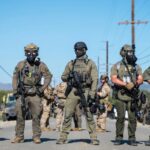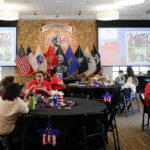
I was horrified at the thought of innocent movie-goers being attacked with gunfire and tear gas by an orange-haired Holmes. The suspect in the Aurora movie shooting, Holmes was allegedly decked out in bullet-proof attire from head to toe. The massacre left 12 dead, including San Antonio native Jessica Ghawi, and left 58 victims injured.
We shuddered at the nightmare, knowing all too well that it could have been any of us.
“I won’t be going to the movies for a while,” I began, “I feel like sitting in a theater would just be eerie. I mean, I know that some guy isn’t going to come in and shoot me, but–” I was cut off.
“No, you don’t know that it won’t happen. That’s the thing; we really don’t know. We don’t ever know,” Megan interrupted.
The truth in her words dumbfounded me. At that moment it suddenly became real for me.
This horrific scene played out right in my hometown, 15 minutes away from my grandparents’ home; 10 minutes away from my brother–so close to my loved ones. Too close.
If it could happen there, it could happen anywhere. How can we even begin to cope with that realization?
The impact of the shootings reverberate in the shocked Aurora community, shaking up Colorado and the rest of the United States. Discussions reignite the gun control debate and deepen our dissatisfaction that the divide over the issue will be resolved.
The public is confused, hurt, frightened and caught in a tumult of these emotions. In the days following, we turn our focus to the individual responsible for this tragedy, and simply ask “Why?”
We can pick apart tangible clues, torture ourselves with the “what-ifs” and dissect every piece of evidence so that we can have a better understanding of “why?” But how does that prepare us for tragedies that will be carried out by different hands in the future?
Here, at this university, we are a growing community, and whether we realize it or not, we are all interconnected. Social, environmental and economic factors affect each one of us because no matter where we live on this planet, we all share this world.
In response to violent tragedy, let’s realize that we have a duty to protect the health, safety and survival of our loved ones. That may offer us the first step in response to others’ senseless actions. Because as much as we hate to admit it, let’s face it: everything we do affects everyone around us and vice versa.
We need to stay connected to our communities, no matter how easy it may seem to detach ourselves. If we can stick together and learn to look out for one another, perhaps we can avert a tragic situation that may be lurking in the shadows of our community.
During the difficult days and weeks following tragedy, let us strengthen and support ourselves, our loved ones, and in turn, our communities because after all–it really is a small world.





